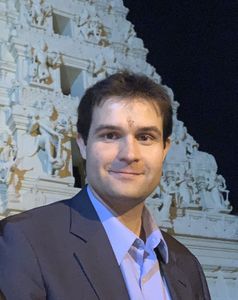GTU Communications
Interview | Wolf Clifton, Presidential Scholarship Recipient
Wolf Gordon Clifton is a recipient of the Presidential Scholarship for the 2023-2024 academic year. Wolf will study in the department of Theology and Ethics. He holds a B.A. in Religious Studies from Vanderbilt University, a M.A. in Museology and Graduate Certificate of Astrobiology from the University of Washington, and a M.S. in Geological Sciences and Graduate Certificate in Conservation Biology from Ohio University.
GTU: What were the formative influences in your life—people, places, experiences—that led you to where you are today
Wolf Clifton: From early childhood, my mother encouraged me to ask existential questions, and to seek answers among all the world's great spiritual traditions. A child of activists in the global animal protection movement, I grew up with a sense of international community and responsibility to serve the common good of people, animals, and the environment. Formative experiences in my journey as a scholar of religion included interviewing a Balinese Hindu priest at age 14; spending a summer in Chennai, India to study the Bhagavad Gita and Upanishads with a guru; researching Buddhist and Confucian perspectives on astrobiology for undergraduate independent study projects; and visiting monasteries, temples, churches, sacred groves, earthen mounds, cemeteries, and other holy sites around the world.
GTU: How would you describe your academic interests?
WC: My academic background is eclectic, including a B.A. in Religious Studies, M.A. in Museology, M.S. in Geological Sciences, and graduate certificates in Astrobiology and Conservation Biology. Professionally, I have worked as the director of an animal protection organization active in United Nations initiatives on sustainability, biodiversity, and the environment. As a doctoral student at GTU, I intend to weave together the threads of religion, natural science, and activism, by studying Dharmic perspectives on ecology, animal ethics, and sustainable development. Examining Hindu and Buddhist communities' historical and modern legacies of care for the living world, I hope to show how Dharmic ecotheology can benefit society, nature, and all living beings in an era of ecological crisis.
GTU: What drew you to attend GTU for your Doctoral studies?
WC: Much of my animal advocacy work has been in the context of the U.N.'s Sustainable Development Agenda, which seeks to fulfill human societal needs in balance with nature. I had been exploring options for a Ph.D. program that could enhance the impact of my work, in fields such as environmental science and public policy, but chose to apply to GTU after learning of Dr. Rita Sherma's work linking sustainability studies to theology. Faith traditions have been deliberating and enacting visions of the common good for millennia, and continue to hold great cultural and institutional power in the world. Earning my Ph.D. at GTU presents a unique opportunity to leverage religions' wisdom and influence to help create sustainable societies, while returning to my own roots as a scholar of Dharma.
GTU: What are you most looking forward to in your Doctoral studies at the GTU?
WC: I am looking forward to earning my Ph.D. in the company of faculty and colleagues representing a rich diversity of spiritual traditions, as well as different approaches to scholarship. Among graduate programs in religion, GTU is remarkable in many respects: in affirming the legitimacy of both "insider" and "outsider" perspectives, supporting theological work in non-Abrahamic traditions, and encouraging constructive engagement with the sciences and other outside disciplines. Joining the GTU community is an incredible honor and I am beyond thrilled to begin the next step of my academic and professional journey!


